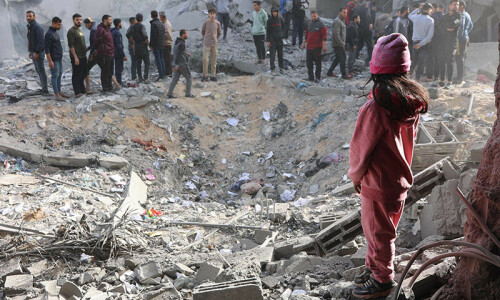PARIS: US Secretary of State John Kerry continued a diplomatic offensive in Europe on Sunday to win support for military action in Syria, as CBS television reported that President Bashar al-Assad denied being behind last month's deadly chemical attack.
After talks with Arab League ministers in Paris, Kerry said they had agreed that the Assad regime had crossed a “global red line” with the alleged attack on August 21.
“All of us agree, not one dissenter, that Assad's deplorable use of chemical weapons... crosses an international global red line,” Kerry said.
Kerry said a number of Arab countries were willing to sign a statement agreed by 12 countries of the G20 that called for a reaction to the alleged attack, and that they would make announcements in the next 24 hours.
“Today we discussed the possible and necessary measures that can be taken,” he said.
He said Saudi Arabia, which participated in the talks along with officials from the Arab League and eight other Arab countries, was among those who had signed on. “They have supported the strike and they have supported taking action,” Kerry said.
US television network CBS meanwhile reported that Assad was denying being responsible for the alleged attack on August 21, which Washington says killed some 1,400 people.
“He denied that he had anything to do with the attack,” CBS veteran correspondent Charlie Rose said, speaking after interviewing Assad in Syria.
The interview is due to be shown early Monday in the United States.
Washington is heading into a crucial week on Syria, with Congress returning from its summer break on Monday to consider President Barack Obama's plans for strikes and UN inspectors due to release a report into the alleged chemical weapons attack by the weekend.
A top White House official said Sunday the Obama administration is planning “for every contingency” in case of any fallout from US military strikes.
But Chief of Staff Denis McDonough refused to be drawn on whether Obama would go ahead with strikes if Congress refuses to give military action a green light.
“We have to obviously be very careful and very targeted and very limited in our engagement so we do not get dragged into the middle of this. And then there's obviously risk of reaction and retaliation against our friends,” McDonough said on CNN's State of the Union, as Obama prepares to address the nation on Tuesday.
The Los Angeles Times reported Sunday that the Pentagon was preparing for three days of attacks on Syria, longer than originally planned.
War planners now aim to unleash a heavy barrage of missile strikes to be followed swiftly by additional attacks on targets that may have been missed or remain standing after the initial launch, the newspaper cited officials as saying.
A US defence official told AFP the scale and purpose of the operation against Syria has not changed in recent weeks, although US forces would adjust as needed.
“We will continue to review our targeting and targeting options as the Syrian government adapts over time,” said the official, who spoke on condition of anonymity.
Obama is facing an uphill battle to convince a sceptical Congress, and a war-weary US public, of the need for action.
On Saturday, Kerry and French Foreign Minister Laurent Fabius insisted that international support for military action was increasing, after the EU issued a statement calling for “strong” action against Assad's regime.
But Iran's Foreign Minister Mohammad Javed Zarif on Sunday slammed the potential strikes against Syria as “illegal”, saying such military action was barred under the United Nations charter.
“Civilised countries, 65 years ago, took the options off the table when they rejected in the charter of the United Nations resort to force as an illegal practice,” Zarif told journalists during a visit to Baghdad.
“Why (do) they (countries supporting a strike) call themselves civilised nations and continue to insist on all options being on the table?” he said.
'Bigger than Syria'
After his meeting with Arab League officials in Paris, Kerry flew to London for talks with Palestinian president Mahmud Abbas on Sunday and to meet British Foreign Secretary William Hague on Monday morning.
Hague on Sunday said although the British parliament had rejected military action against Syria, he backed US-led air strikes against the regime.
“I do believe very strongly that the world must stand up against the use of chemical weapons. The risks of not doing so in my view are greater than the risks of doing so,” Hague told BBC television.
“This issue is about chemical weapons, which is a bigger issue than Syria.”
Fighting continued to rage inside Syria meanwhile, with reports that rebel forces, including militants linked to al-Qaeda, had taken control of the historic Christian town of Maalula, north of Damascus.
The Syrian conflict, which began in March 2011, has left more than 100,000 dead, according to the United Nations.












































Dear visitor, the comments section is undergoing an overhaul and will return soon.